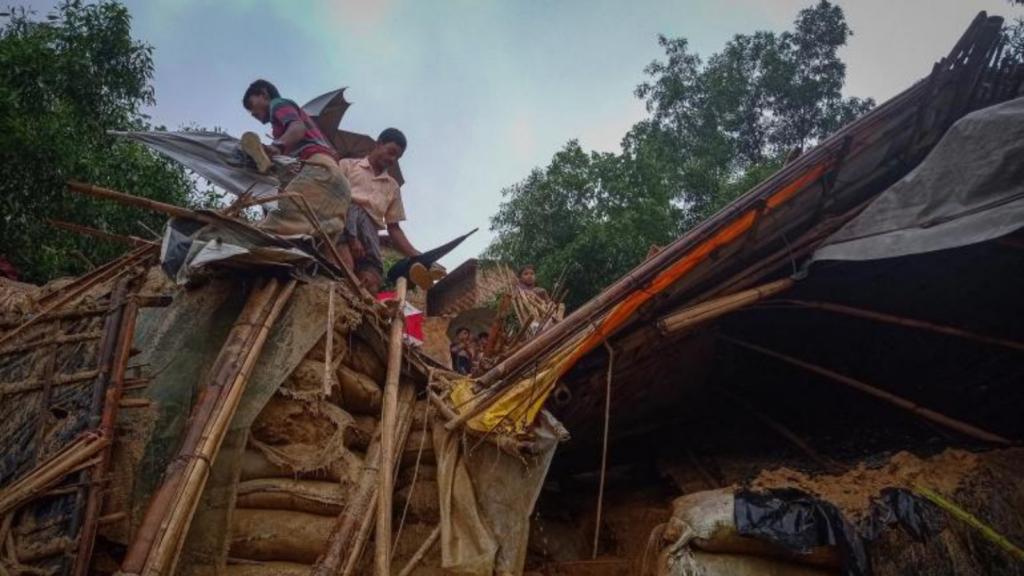Updates & Press
Featured | July 30, 2021
Weekly Humanitarian News Digest – July 30
Author | MedGlobalComms

Each week, we highlight the latest news related to the humanitarian and health crises in our countries of operation: Bangladesh/ Myanmar, Colombia/ Venezuela, Gaza/ Palestinan Territories, India, Lebanon, Pakistan, Sudan, Syria, and Yemen. For more frequent updates, make sure to follow us on Facebook, Instagram, and Twitter.
Cover Image: AFP/Tanbir Miraj
Latest News for July 26 – July 30, 2021
Bangladesh/ Myanmar
Flash floods and landslides in Cox’s Bazar have killed at least 14 this week. Rohingya refugees in Cox’s Bazar, Bangladesh face dangers as the annual monsoon season brings flash floods, heavy rains, and landslides. Shelters and health infrastructure in the camps are at high risk for destruction. Nearly 10,000 Rohingya have been evacuated over the last few days after their shelters had been destroyed due to the severe weather. (Al Jazeera)
Colombia/ Venezuela
Colombia has seen high rates of domestic violence and sexual assault amidst armed conflict and COVID-19 lockdown. Survivors of sexual assault in Colombia have formed Mujeres Sembrando Vida (Women Sowing Life), a group dedicated to supporting other survivors of GBV in conflict-affected areas. The organization provides assistance to survivors who wish to report their assault, leads gender equality workshops, and also functions as a support group. (The Guardian)
Gaza/ Palestinian Territories
Vaccine hesitancy is damaging Gaza’s COVID-19 vaccine rollout. According to Gaza’s Health Ministry, only 5% of those eligible have received the COVID-19 vaccine. Damaged health infrastructure and difficulty of physical distancing makes vaccination especially vital. Skepticism and misinformation are some of the biggest challenges. (Al Jazeera)
India
India’s monsoon season has brought over 250 deaths in the past month alone. 30,000 additional people have had to be evacuated to relief camps. Rescue workers in Maharashtra continue to work towards locating those cut off by landslides triggered by heavy rains. Climate change continues to exacerbate existing threats. (New York Times)
Lebanon
A year after the Beirut Blast, humanitarian crises in Lebanon have only worsened. 33% of children go to bed hungry and over 50% of the country is living in poverty. Lebanon’s economic crisis has taken an especially large toll on the country’s health facilities, most of which lack life-saving medications and face medical oxygen shortages. (Project HOPE)
Pakistan
343 Afghan migrants recently returned to Afghanistan after previously seeking refuge in Pakistan. 286 returned via the Chaman border point, and 57 returned through the Torkham border point. Of the 343 total returning migrants, 12% were either elderly or dealt with chronic health issues, and are therefore especially vulnerable to negative health outcomes associated with migration difficulties. (International Organization for Migration)
Sudan
The UN-African Union Mission in Darfur is in its final stages of shutdown. After protecting civilians in Darfur for the last 13 years, the mission’s mandate ended on schedule last December. Now, nearly all staff members and UN peacekeepers have left and nearly $41 million in equipment and facilities have been transferred to local authorities. (UN News)
Syria
Families living in the city of Raqqa are still living in ruins and lack options for the future. Four years ago, Raqqa saw as many as 150 air raids per day. Today, 36% of the city’s infrastructure remains in ruins while civilian health and safety continue to be at stake. Threat of land mines, lack of education, clean water, and lack of electricity are some of the most pressing concerns. (Al Jazeera)
Yemen
Multiple, intersecting humanitarian crises continue to plague Yemen. Acute malnutrition and food insecurity are some of the most dire threats. 2.3 million children in Yemen are projected to experience acute malnutrition in 2021. 400,000 face death if they don’t receive immediate humanitarian aid. These existing crises have been exacerbated by the COVID-19 pandemic. (ReliefWeb)


